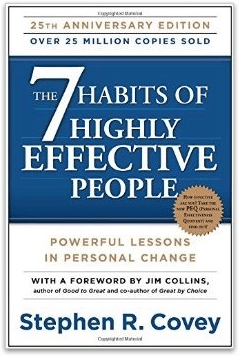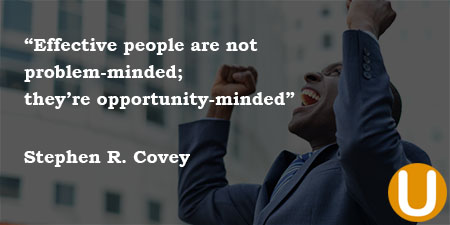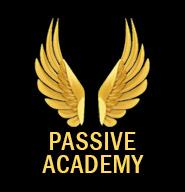The 7 Habits of Highly Effective People Summary - Book by Stephen R. Covey
The Book in Three Sentences
The 7 habits of highly effective people summary at a glance:
1. Do you need to change the world if you just don’t like your life, or do you need to change yourself, and the way you view the world?
2. In this book, Stephen Covey talks about why perception is the main key to personal change and how we can change it to live a better life.
So, if we want all the joys of outward success, first we must master ourselves “Private victories precede public victories.”
The 5 Big Ideas
1. You have the ability to choose your response to any given situation and be more proactive.
2. A paradigm is the map through which we see the world.
3. First master yourself, then you’ll be able to master the world!
4. Put first things first and set your goals and priorities correctly.
5. Always seek for more personal growth in 4 areas: your body, mind, heart and soul.
The 7 Habits of Highly Effective People
The 7 Habits of Highly Effective People Summary
Big Idea #1 Change is “Inside Out”
People who want to change a situation must first change themselves. And if they want to change themselves effectively, they must first change their perceptions, inner-values and ethics.
Big Idea #2 Paradigms and paradigm shift
Paradigms are the map or the platform from which people judge other people. They are the source of people's perceptions and interpretations about him/herself and about everything in life. If the person is using the wrong map, then he may not get anywhere near his goal.
So, if this person is using a wrong map, he/she should have a paradigm shift. Paradigm is also subject to change; it happens because a person gains better insight and sees the bigger scheme of things.
Look at this picture, do you see an old woman or a young woman?
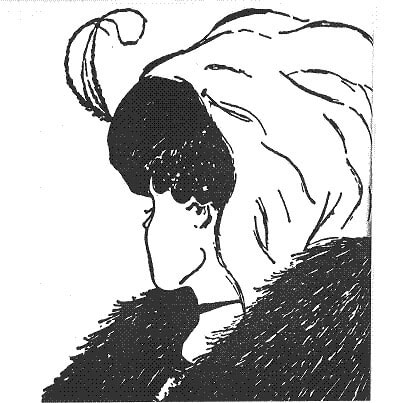
If you look at the picture one way, you see an old woman. And if you look another way, you see a young woman. How you interpret the picture depends upon your paradigm. And your paradigm determines what you are going to say about that picture.
Big Idea #3 What is a habit? And how habits are formed?
The definition of the habit is: a settled or regular tendency or practice, especially one that is hard to give up. And certain basic principles and values make people more effective, as we will see in this book.
Aristotle said, we are what we habitually do. So, to develop any habit you must:
- Know — Understand what you want to do and why you want to do it.
- Develop skills — Become able to do it.
- Desire — You must want and will yourself to do it.

How Habits are Formed
And that takes us to knowing that the most important work is the inner work. When you master your interior self, you will master what is outside of you. And that what many people don’t take care of, they just focus on production and on making a measurable, visible difference, and neglect their inner bigger world.
Big Idea #4 Maturity continuum from dependence to interdependence
The Seven Habits illustrated in this book takes place within a Maturity Continuum.
The continuum is a three-tiered model progressing from dependence to independence, then to interdependence.
Is it getting confusing? Let’s make it simple.
- Dependence is “you-oriented”: You should have done this, you didn't arrive, it's your fault.
- Independence is “I-oriented”: I’m capable of doing it. I can achieve the goal. I’m in control.
- Interdependence is “we-oriented”: We can do it, we can beat the deadline, we can achieve better things together.
Look at this picture.
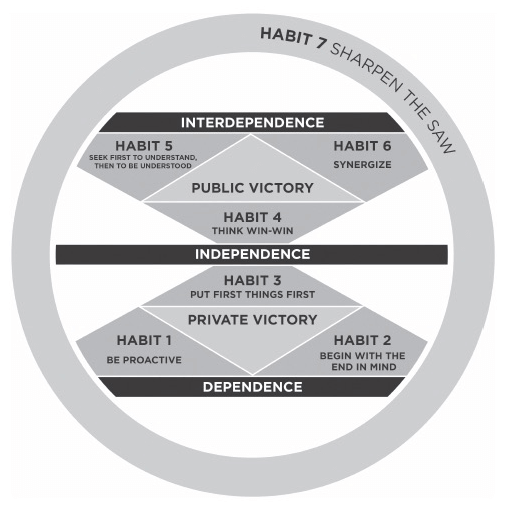
The 7 Habits of Highly Effective People
Habits 1, 2, and 3 will help a person move from a state of dependence to independence because it involves knowing of the self and nurturing character growth. So, these habits pertain to “Private Victories”.
Before a person becomes truly independent, he/she must feel worthy and capable of becoming independent. And this emphasize the big idea #1 that change is “inside-out”.
Then as a person becomes more independent, he can move to Habits 4, 5, and 6 which are more concerned with “Public Victories”, or the more personality-oriented aspects of interpersonal communication.
Then, habit 7 pushes a person to new levels of understanding and thinking. It is an all-encompassing habit; it pertains to all the first six habits to help in the person’s continuous personal improvement lifetime journey.
So now let’s get down to business and talk about the 7 habits of highly effective people in details.
From dependence to independence “Private Victories”
Habit 1: Be proactive
“Look at the word responsibility—’response-ability’—the ability to choose your response. Highly proactive people recognize that responsibility. They do not blame circumstances, conditions, or conditioning for their behavior. Their behavior is a product of their own conscious choice, based on values, rather than a product of their conditions, based on feeling.”
Being proactive is simply being able to choose how to respond to any given situation, and that what Stephen Covey calls “response-ability”.
So… How can you be more proactive and less reactive today?
Just don’t blame the weather for your bad day! A LOT of people at the end of each year blame the year itself for haven’t achieving their goals!
Just take the responsibility of your life and success. You can choose to be more initiative. Let’s be response-able to the challenges we face in our lives.
And remember, as Covey says: “The commitments we make to ourselves and to others, and our integrity to those commitments, is the essence and clearest manifestation of our proactivity.”
And that takes us to habit #2 which teaches you to focus on your goals, “Begin with the end in mind”.
Habit 2: Begin with the end in mind
“Begin with the end in mind” is based on the principle that all things are created twice. There’s a mental or first creation, and a physical or second creation to all things.”
I can also say: Focus on your end goals. Any thing you can do is created twice: First in the mind and then in reality. So, first we must get clear on what we want. Then we create it in reality.
Think of building a house. What comes before building it? Are you going to bring the construction team and start building immediately? Or make a blueprint with your architect first?
Many people start something -a business for example- without knowing any idea about what they can get out of it for the long term.
And many people also struggle with their relationships and may ruin them because they don’t have a vision for these relationships.
Okay, there is an exercise to emphasize this concept in your mind.
Stephen Covey Funeral Exercise:
Think about a funeral. Imagine yourself walking around in this funeral.
And then you realize that’s actually your funeral. Imagine what people could honestly say about you based on the way you are now. Do you like what you hear? Is that how you want to be remembered?
Take some time right now to sit down and reflect on this. It’s a really powerful exercise to gain clarity on your highest values. Take hold of your life and change whatever needs to be changed today.
And that takes us to habit #3 which teaches you to set priorities, “Put first things first”.
Habit 3: Put first things first
When you ask anyone, what are the most important things in your life? He'll probably say, his/her health, family, spouse and children. But when you ask him about the last time he went to the gym, or the last time he went out with his family, that may be a long time ago. Instead he spends the majority of his time at work, or even watching TV.
So, how do you spend your days? Do you waste your time and energy, doing stuff that simply isn’t that important?
Time Management:
Covey has a brilliant 4-quadrant model for time management.
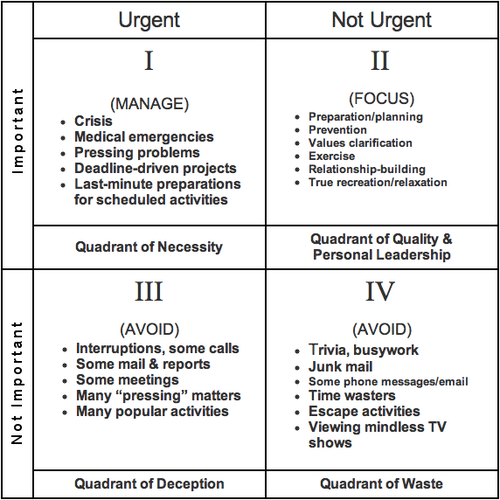
Covey Time Management Matrix
Notice the two factors that define an activity in this model: Is it urgent? And, Is it important?
“Effective people stay out of Quadrants III and IV because, urgent or not, they aren’t important. They also shrink Quadrant I down to size by spending more time in Quadrant II… Quadrant II is the heart of effective personal management.”
It’s simple. Urgent means it’s demanding our attention NOW! Important means it’s worth doing. Notice Quadrant II: The Important but Not Urgent stuff. We should spend the majority of our time there.
Learn to Say NO:
And that takes us to another big idea. You should be able to say “No” to whatever distracts you.
“You have to decide what your highest priorities are and have the courage—pleasantly, smilingly, non-apologetically, to say “no” to other things. And the way you do that is by having a bigger “yes” burning inside. The enemy of the “best” is often the “good.”
Set Priorities:
And you also should be able to set priorities.
Question from Dr. Covey: “If you were to fault yourself in one of three areas, which would it be:
(1) the inability to prioritize;
(2) the inability or desire to organize around those priorities;
or (3) the lack of discipline to execute around them? …
Most people say their main fault is a lack of discipline. On deeper thought, I believe that is not the case. The basic problem is that their priorities have not become deeply planted in their hearts and minds. They haven’t really internalized Habit 2 [Begin with the end in mind].”
So, begin with the end in mind, have your goals crystal clear, set you priorities, say no to distractions, and you’re now independent! Ready for interdependence phase?
From independence to interdependence “Public Victories”
Habit 4: Think win/win
Do you approach relationships (business or intimate) with a true desire to see the other person “win”?
Win/Win situations empower both parties to a strong commitment after reaching a mutually satisfying decision. This paradigm views life as an arena of cooperation and not of competition.
You have to believe that there is abundance for everyone to enjoy. A win/win situation does not constrict outcomes instead it enlarges it for both parties.
So how can you both win? That takes us to habit #5 which teaches you how to communicate with others, “Seek first to understand then be understood”.
Habit 5: Seek first to understand then be understood
“Most people do not listen with the intent to understand; they listen with the intent to reply.”
Many people in negotiation or any conversation try to prove they’re right and the other person’s opinion is wrong.

What can you do today to try to see the other person’s perspective before working so hard to make sure they get yours?!
Just slow down, take you time and listen. Try to deeply to understand and see the other person’s perspective, so you will both win.
And when you understand others and think “win/win”, that leads us to habit #6 which teaches the meaning of cooperation, “Synergize”.
Habit 6: Synergize
“Synergy is everywhere in nature. If you plant two plants close together, the roots commingle and improve the quality of the soil so that both plants will grow better than if they were separated. If you put two pieces of wood together, they will hold much more than the total weight held by each separately. The whole is greater than the sum of its parts. One plus one equals three or more.”
Simply, synergy meaning is 1 + 1 = 3+.
That means when we work together, one plus one equals more than two. Cooperation and communication are the two legs of a synergistic relationship. Listen, reflect, respond and cooperate.
What synergistic relationship can you be more grateful for today? And what relationship needs to be fixed?
Personal Growth
Habit 7: Sharpen the saw
Covey tells a brilliant story of a man in the forest sawing down a tree with a blunt saw. He saws and saws for a long time. Working so hard but not getting far. A passerby suggests he take a break and sharpen his saw and gets the reply, “But I don’t have time for that.”
That’s so ridiculous and also true. We sometimes work so hard that we forget to take a break and have a look at what we’re doing and see the big picture, so we can alter things, improve ourselves and grow! We’re just so busy being busy!

The 7th Habit is very simple: Take the time to renew. Sharpen your saw.
Highly effective people take the time they need to sharpen their tools, which are, in fact, their bodies, souls, minds and hearts.
How can you do that? You can exercise, meditate, pray, journal, spend time with loved ones, go on vacation, play, read more, take courses, enjoy your hobbies.
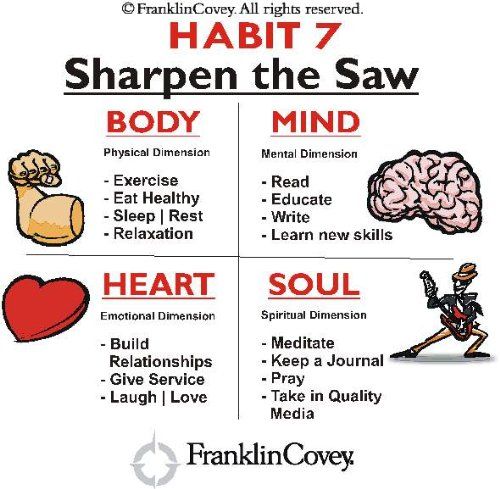
Your Mission
The final thought, ask yourself this question: What am I here to do? What’s my specific mission in life?
Answer: My specific mission is……
Take your time, write this down on a piece of paper and put it in front of you, read it every day. This is your biggest “Why” and your fuel for living the life you deserve.
That was my review, a very quick look at The 7 Habits. If you haven’t read it yet and you’re interested in it, get a copy. There is a HUGE amount of wisdom and value in this book as you see, and we’ve only touched on a tiny bit of it.

